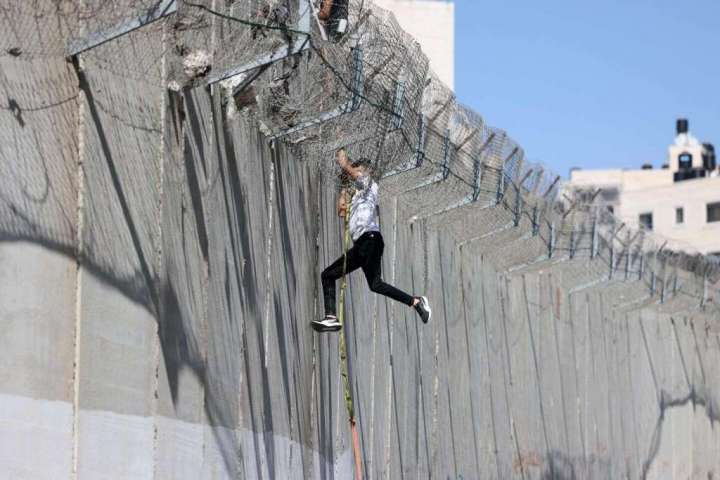TURMUS AYYA, West Bank — When President Biden visits Bethlehem on Friday for a short meeting with the Palestinian Authority president, he will arrive in a region that since his last visit six years ago has descended deeper into autocracy, leaving an entire generation politically numb.
As Biden visits, Palestinians reminded of their descent into autocracy

While Biden’s visit will celebrate Israel’s increasing integration in the region, the Palestinians find their own situation steadily worsening as they are ruled by what they see as an authoritarian government more attuned to Israel’s needs than their own.
Fadi Quran, 34, a political analyst from Al-Bireh in the West Bank, said Biden’s visit will officially legitimize authoritarian practices in the Palestinian Authority, which he called “a glamorized, post-modern Uncle Tom to Israel’s apartheid.”
Biden will open his Middle East trip in Israel and the West Bank, but its real spotlight is its last leg. The U.S. president will fly from Israel to Saudi Arabia, a visit that Biden said in an op-ed in The Washington Post will serve as “a small symbol of the budding relations and steps toward normalization between Israel and the Arab world, which my administration is working to deepen and expand.”
He was referring to the Abraham Accords that have, with tacit Saudi support, enabled diplomatic, economic and security ties between Israel and four Arab states over the past two years — a normalization that those same Arab states, for decades, said would be possible only if Israel took steps toward ending its now 55-year-old occupation of the West Bank and establishing an independent Palestinian state.
“Biden is here for Israel, not for us,” said Hamza Ghunaim, 18, a recent high school graduate from the West Bank village of Turmus Ayya, who is hoping to use his American passport to study medicine in the United States.
Ghunaim, speaking in a supermarket parking lot in this once-agricultural village with a large population of dual American-Palestinian citizens, said he struggles to see a future in his homeland. Since childhood, Ghunaim has witnessed a rapid influx of Israeli settlers, who now number about half a million in the West Bank — land that Palestinians envision as part of their future state.
“The visit, 100 percent, helps Israel and harms us,” said Mohammad Awad, 19, joining the group of young men outside the supermarket.
The Biden administration has restored $500 million in financial aid to the Palestinians that was cut off by President Donald Trump. It has said Palestinians are entitled to the same measure of “freedom, security and prosperity” enjoyed by Israelis. But Palestinians under Israeli occupation suffer from limited freedom of movement.
Only 100,000, out of the more than 5 million Palestinians in the West Bank and the Gaza Strip, are eligible for permits to cross Israel’s towering separation barrier to visit family or work in Israel, typically in menial jobs like construction or food service.
Dimitri Diliani, a senior member of Abbas’s Fatah party who supports an anti-Abbas faction, said the request for financial aid probably came from Israel, which sees Palestinian economic stability as part of its counterterrorism strategy.
He also noted that Abbas is not expected to bring up the May killing of Palestinian American journalist Shireen Abu Akleh, who most investigations say was shot by Israeli soldiers.
“The U.S., and so the P.A., have decided to sell the blood of Shireen and American citizens to support the Israeli coverup,” Diliani said.
Israeli and Palestinian experts say Abbas and his inner circle rely on Israeli military coordination for their own safety. In return, critics say, Palestinian security forces crack down on dissent in any form. Last month, 14 Palestinian Authority security personnel who were accused of killing the vocal anti-corruption dissident Nizar Banat in 2021, were released on bail.
The court cited the risk of the coronavirus spreading in the jail. In a statement to the media last month, Ghassan Banat, Nizar’s brother, said the claim was an excuse and only further proof of “Abbas’s bloody regime.”
Omar Abu Habib, 32, from the West Bank village of Salfit, said that he agreed with most of Banat’s criticisms of Abbas and the Palestinian Authority — that they collude with Israel for their own personal gain, pocket international aid money and are “traitors” to their own people — but that he would never publicly express his opinions on social media.
“If you say one word of criticism, the intelligence services will interrogate you,” he said. “So, I self-censor.”
Abu Habib, whose father once worked with the Palestinian nationalist leader Yasser Arafat, said the two-state solution Biden supports, in which an independent Palestinian state would be established alongside Israel, is “impossible.”
“The only solution is for all the Jews to go,” he said referring to the historic land of Palestine, including Israel, “and to do that, we need armed resistance, like in Gaza,” he said, referring to the Palestinian enclave ruled by the militant Islamist group Hamas. “Their economic situation is bad, but at least they have their dignity.”
According to the Palestinian Center for Policy and Survey Research, a Ramallah-based pollster, only 28 percent of Palestinians support a two-state solution and 55 percent would welcome a return of confrontations between Israel and the Palestinians.
Ahead of Biden’s visit, Abbas and Israeli Prime Minister Yair Lapid spoke on the phone last week, marking the first such call in five years. Hussein al-Sheikh, the secretary general of the Palestine Liberation Organization, who is widely expected to succeed Abbas, tweeted that on the call the Palestinian leader “stressed on the importance of preparing the calm atmosphere before President Biden’s visit, which we welcome.”
But Diaa Ali, 32, a student of Israel studies at Birzeit University in the West Bank, said maintaining that “calm atmosphere” has come at the price of Palestinian democracy.
“We know that the U.S. supports some democracies and some dictatorships in the world, and we’re the latter,” he said.
Sufian Taha contributed to this report.






